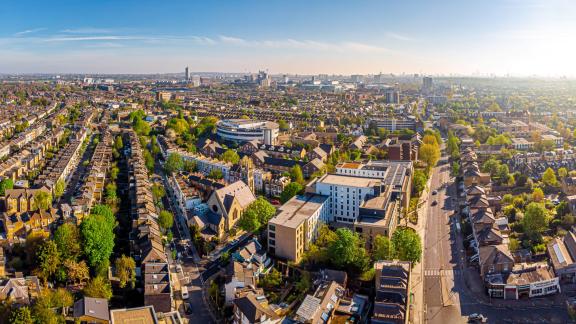The NHS in England and its response to COVID-19

Services are being transformed but big challenges remain, writes Prof Sir Chris Ham.
The NHS in England is being transformed in response to COVID-19. General practices are working together in each area to provide care for patients who are suspected of having the virus at a designated surgery or clinic. Other patients are seen in different facilities or make use of telephone consultations or NHS 111. Some routine work has been stopped.
Hospitals have cut back on outpatient services and planned surgery to protect capacity for COVID-19 patients. They have also been asked to accelerate the discharge of medically optimised inpatients to release beds in anticipation of increasing admissions from patients with the virus. NHS England and NHS Improvement estimates that 30,000 hospitals beds – roughly equivalent to 50 hospitals – have been made available as a result.
These beds have been enhanced by the NHS taking over the use of private hospitals and establishing new field hospitals in converted conference centres in London, Birmingham and Manchester and other locations. The support of the army in establishing field hospitals and distributing equipment reinforces the impression of a country using all the resources at its disposal as it does battle with the virus.
Hospitals have also increased substantially their intensive care capacity. This includes investing in additional ventilators to care for the most seriously ill patients and retraining staff to deliver intensive care. Partnerships between the NHS, universities and manufacturers are enabling additional equipment and tests to be developed and brought into use at an unprecedented speed.
Recently retired staff have been invited to return to work in the NHS and around 12,000 have heeded the call. Medical and nursing students have also been enlisted to work in frontline care. Support is being provided by over 750,000 volunteers who have come forward to deliver medicines and food to people who are most vulnerable, as well as undertaking other tasks.
The commitment of frontline staff was recognised in the spontaneous expression of gratitude by the public on doorsteps around the country on 26 March. The public understand that these staff are where the battle against COVID-19 will be won, and their health and wellbeing are of paramount importance. All the more concerning therefore that there have been delays in testing staff for the virus and difficulties in procuring and distributing personal protective equipment (PPE).
With a growing number of staff unable to work because of sickness or self-isolation, the ability of the NHS to diagnose and treat patients in a timely and effective manner is being compromised. Finding a solution to staff testing is now an urgent priority. This includes making use of appropriate laboratories outside the NHS to ensure rapid delivery of results to enable staff to return to work where appropriate.
Another concern has been the ability of NHS community services and social care to support people needing care in their own homes or in residential care. Additional funding for social care is helping, but the shortage of PPE in the community is causing difficulties. Supporting GPs and their teams to work with community nurses to provide care for people at home that previously would have been delivered in hospitals is also challenging.
A related concern is the ability of voluntary and community services to continue to deliver care in partnership with the NHS and local authorities. Many of these services are run by charities dependent on donations and fundraising, which have become more difficult to secure. The Chancellor’s recent announcement of funding to support charities will provide some much-needed relief.
The impact of these changes on non-COVID-19 patients is receiving increasing attention, especially those with acute medical conditions and mothers and babies during pregnancy. NHS England and NHS Improvement has issued guidance on cancer services emphasising that essential and urgent cancer treatments must continue. Similar action is needed for other services where patients may be harmed by delays in diagnosis and treatment.
As the crisis evolves, new challenges are emerging. The supply of oxygen, for example, is already problematic in some hospitals in London and south east where demand for care has risen faster and further than in the rest of England. NHS England and NHS Improvement has written to hospitals identifying this as a critical safety concern that must be addressed urgently.
For patients, COVID-19 is a reminder of the importance of specialist services like intensive care at times of crisis. Advice on handwashing, social distancing and staying at home for people who are most vulnerable underline the role each person plays in promoting health and avoid sickness. Seeing patients and the public as partners in improving health is a lesson to be learned and applied in other areas of care when the crisis has passed.
The reckoning on how the NHS has responded, when it occurs, will offer a more considered and thorough assessment than is possible at this point. Many countries face the same challenges as England and all are competing in a global market for scarce testing capacity and equipment, like ventilators. Government constraints on funding during the last decade mean that the NHS faces greater challenges than most, but in truth, no country has built sufficient slack in their healthcare systems to be confident of dealing effectively with a pandemic on this scale.
Chris Ham is chair of the Coventry and Warwickshire Health and Care Partnership, non-executive director of the Royal Free London Hospitals Foundation Trust and co-chair of the NHS Assembly. Follow him on Twitter @profchrisham



